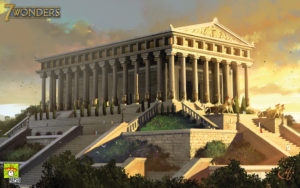 In Week 1, “A Place of Power,” we learned about some of the historical and cultural context of Ephesus, the setting for the letter called Ephesians and Acts chapter 19. We learned, for example, that Ephesus was home to the Temple of Artemis, one the “seven wonders” of the ancient world. This is a very important piece of context as we continue to discuss Paul’s time in Ephesus, establishing an outpost of God’s Kingdom, a community of misfits following the Way of Jesus.
In Week 1, “A Place of Power,” we learned about some of the historical and cultural context of Ephesus, the setting for the letter called Ephesians and Acts chapter 19. We learned, for example, that Ephesus was home to the Temple of Artemis, one the “seven wonders” of the ancient world. This is a very important piece of context as we continue to discuss Paul’s time in Ephesus, establishing an outpost of God’s Kingdom, a community of misfits following the Way of Jesus.
In verses 1—20, we saw that Paul’s preaching of the Kingdom of God was not always welcomed (v. 9a). Luke doesn’t tell us precisely what it was that Jewish members of the synagogue in Ephesus reacted to with anger and maligned the Way of Jesus, but one thing we know for sure is that everywhere Paul went and in everything he wrote (included the letter called Ephesians), he proclaims that Jesus has brought together Jews and Gentiles in one body, a new temple, that destroys the dividing wall of hostility by abolishing the divisive regulations of the Torah (Ephesians 2.11-22). This was a very controversial message among first-century Jews. As in many other cities, that is likely why Paul left the synagogue and began hosting gatherings in the lecture hall of Tyrannus (v. 9b). In verses 23-41, we’ll see another aspect of Ephesus society that was greatly disturbed by the Way of Jesus. The Gospel of the Kingdom that Paul preached was powerful, and Ephesus was a place of power, so the powers collided in an explosive way.
Group Discussion Questions
Read Acts 19, verses 23 through 27
- Luke continues his account of Paul’s time in Ephesus by introducing a new character into the story: Demetrius, the silversmith. How does Demetrius make his living? What is the relevance of the industries that profit from idolatry for readers of this account today where we live?
- What is Demetrius’s accusation against Paul? Is it a credible accusation, or has he misunderstood Paul’s message?
- What do we learn about the relatedness of the “spiritual” and the “economic” aspects of Ephesian society from these verses?
“Confronting those powers that oppose God often means confronting those seeking to protect their wealth.”
“Once again these disciples of Jesus are disrupting the smooth flow of production and consumption of good and services.”
“We understand the logic of idolatry is not in the idol alone, but also in the economies of production and consumption that order our lives toward futility and death. Sadly, Christians continue to underutilize this precious knowledge by not bringing into view and calling into question other realities of idolatry, from processed and diseased-producing foods, to machines that destroy the environment, to practices of consumption that foster greed and disregard for life. Demetrius grasped the obvious: their financial world is threatened and would be overturned by this gospel Paul was preaching.” 1
Read verses 28 through 41
- Demetrius’s complaint energizes a crowd that rallies around the central figure of their city: “Artemis of the Ephesian”. Quickly, this crowd has “seized” some of Paul’s traveling companions (v. 29) What does this imagery of a crowd chanting slogans and seizing people bring to your mind?
- Artemis was more than just a goddess that some in Ephesus worshipped, she was also a symbol that united the citizens of Ephesus. What is the role of civic or national pride in this story? What is the role of civic or national pride in our lives? In what ways do such allegiances conflict with following the Way of Jesus?
- Luke tells us the crowd gathered in the theater chanted their slogan in unison for two hours. What do you think is happening in the hearts and minds of those gathered there? What does this imagery bring to your mind?
“There was a time when the church was very powerful. It was during that period that the early Christians rejoiced when they were deemed worthy to suffer for what they believed. In those days the church was not merely a thermometer that recorded the ideas and principles of popular opinion; it was the thermostat that transformed the mores of society. Wherever the early Christians entered a town the power structure got disturbed and immediately sought to convict them for being ‘disturbers of the peace’ and ‘outside agitators.’ But they went on with the conviction that they were ‘a colony of heaven’ and had to obey God rather than man. They were small in number but big in commitment. They were too God-intoxicated to be ‘astronomically intimidated.’ They brought an end to such ancient evils as infanticide and gladiatorial contest.
Things are different now. The contemporary church is so often a weak, ineffectual voice with an uncertain sound. It is so often the arch supporter of the status quo. Far from being disturbed by the presence of the church, the power structure of the average community is consoled by the church’s often vocal sanction of things as they are.
But the judgment of God is upon the church as never before. If the church of today does not recapture the sacrificial spirit of the early church, it will lose its authentic ring, forfeit the loyalty of millions, and be dismissed as an irrelevant social club with no meaning for the twentieth century. I meet young people every day whose disappointment with the church has risen to outright disgust.” 2
- Like the apostle Paul writing to the churches in the Roman province of “Asia,” Dr. Martin Luther King wrote these words from a jail cell in Birmingham, Alabama. He speaks of the social impact of the Gospel in the ancient world. “Infanticide” was the common practice of exposing unwanted children to the elements. And gladiatorial contest were the brutal and public fights-to-the-death that entertained Romans. Dr. King wrote these words in the context of the American civil rights movement of the 50s and 60s. What do you think the story of Paul in Ephesus has to do with Dr. King’s words? What relevance do you think Dr. King’s words and the story of Paul in Ephesus have for us today?
- Willie James Jennings, Acts (Westminster John Knox, 2017), p.188-189.
- Dr. Martin Luther King, “A Letter from a Birmingham Jail” (April 16, 1963).


